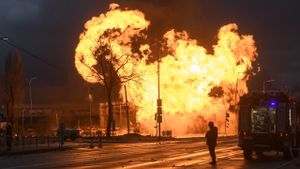A heart-wrenching incident unfolded at Edinburgh Zoo when Roxie, a mere three-month-old red panda cub, succumbed to stress-induced complications stemming from fireworks. She died on November 5, coinciding with Bonfire Night, celebrated across the UK with jubilant firework displays. According to experts from the Royal Zoological Society of Scotland (RZSS), the loud and explosive noises overwhelmed Roxie, leading to her tragic death by choking on her own vomit.
Roxie's passing came just five days after her mother, Ginger, unexpectedly died, raising concerns about the impact of stress on animals during such celebratory events. Initial reports from RZSS indicated Roxie was responding positively to specialized care and was feeding independently. Yet, as the fireworks rumbled during the evening of Bonfire Night, CCTV footage showed the young panda becoming increasingly agitated.
Ben Supple, Deputy Chief Executive of RZSS, conveyed deep sadness over Roxie’s demise. "Before her death, Roxie was responding well to the specialized care of the zoo's expert team and was feeding independently," he stated. "Very sadly, she choked on her vomit on Bonfire Night, and our vets believe this was probably a reaction to fireworks." Despite the den's accessibility, equipped with deep bedding made of hay, the distressing noises proved to be too much for her sensitive system.
The incident has stirred significant concern about the use of fireworks and their consequences for animal welfare. Animals are known to react badly to the explosive booms and bright flashes, which can evoke fear and distress. Roxie's case has ignited calls from animal welfare organizations for stricter regulations on fireworks. The RZSS supports these initiatives, advocating for tighter controls on their sale and use. Supple emphasized, "Fireworks can cause fear and distress for pets, livestock, and animals in zoos, so it is important the UK and Scottish governments tighten restrictions on their sale and use."
This tragedy is not isolated. Over one million people have signed petitions demanding stringent regulations to mitigate the hazardous impact of fireworks during public celebrations. The Royal Society for the Prevention of Cruelty to Animals (RSPCA) echoed these sentiments, noting they have received over 13,000 complaints about animals affected by fireworks over the past three years.
On Bonfire Night, or Guy Fawkes Night, the air fills with explosive sound as thousands celebrate the foiled plan to blow up England’s Parliament back in 1605. The fireworks can reach sound levels upwards of 160 decibels, which, astonishingly, can surpass the noise of jet engines and causes significant distress among the animal kingdom. Supple mentioned red pandas are especially sensitive, stating, "Red pandas can hear at very low frequencies, which means they can be disturbed by fireworks from any distance." He added, "Silent fireworks are not really the answer, as they can still emit low-frequency noises disturbing to red pandas and other wildlife."
Edinburgh Zoo provides sanctuary for various species, where this year's Bonfire Night was particularly traumatic. Known animals, including giraffes, lions, tigers, and more, are often secured indoors to protect them from the overwhelming stress of fireworks. Following Roxie's passing, the zoo is pressing for regulatory changes to safeguard future animals. They advocate governing bodies permit only organized displays, minimizing public access to fireworks.
Red pandas, like Roxie, are classified as endangered species. Habitat loss, human encroachment, and poaching pose significant threats to their survival, with approximately 2,500 thought to remain safely within their native regions. Roxie's heartbreaking death shines light not only on the damaging effects of fireworks but also on the broader conservation issues surrounding endangered species.
"Animals like Roxie are tremendously popular, and they help engage people with nature, building awareness about the global biodiversity crisis," Supple remarked. With conservation efforts underway to protect these creatures and their habitats, the loss of Roxie serves as both a poignant reminder and rallying cry for animal welfare advocates.
The RZSS calls for only light displays during large public events, ensuring the enjoyment of celebrations does not come at the expense of animal welfare. "This would assist us to avoid devastating consequences for animals like Roxie, allowing people to appreciate traditional festivities without distressing local wildlife," concluded Supple.
Following Roxie’s death, discussions around fireworks safety have reignited, as local governments have yet to implement effective measures to protect vulnerable wildlife during celebratory events. Roxie becomes more than just another tragic statistic; her story urges change. Advocates hope regulatory adjustments may save more animals like her from the potential havoc posed by explosive celebrations. The tragic tale of Roxie creates ripples urging society to rethink its approach to fireworks and their place within animal care and environmental consciousness.



